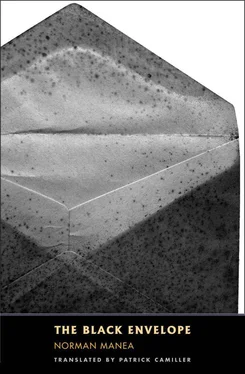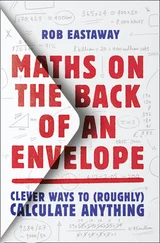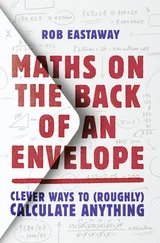Suddenly an old man no longer able to ward off the inevitable? Just because he had received some kind of dark message? The thought departed and returned — a brief luminescence, the red-hot point of a needle. Yes, she should tell all this to Mircea.
Dida slowly turned in front of the window to face the wedding table. She actually turned to the slow rhythm of the words: yes, Mircea could be told about it. And incredibly she smiled, beaming like a simpleton. As if under a spell, idiotically. So many memories out of season: despair and panic and yet a kind of diffident, fatalistic reconciliation lacking in energy, like a shallow consolation — caught up in the aura of the legend, the secret incandescence, of the magic cavalier who, until yesterday evening, had been her beloved Marcu Vancea; safe from the eyes of the world.
Having turned to face the festively lit room after so many hours of shocked stillness, Dida Voinov met the eyes of Mircea Claudiu himself, the son who had probably been watching for some time, in silence, how she kept pressing the palms of her hands against the window frame, as a last, reassuring physical contact with reality. A bald young man, with long sideburns on a rosy round cheek, could be seen in the edge of the mirror. Short eyebrows, large marshy eyes. Yes, she remembered the boy — a tidy pupil, effortless prize winner, and good at sports. The headmaster had not suppressed his stupefaction: “Our eminent Mircea Claudiu! Just think, madam, he has stolen a classmate’s wallet! A handsome sum, my dear lady. It’s incredible! Who would have imagined it? Unbelievable!” But the eminent Mircea Claudiu had smilingly admitted it, without a moment’s hesitation, looking straight into the headmaster’s eyes. Nor were those yet the years of material difficulty that would follow Tolea’s bicycle accident, when Mircea had to start working in his spare time as an architect’s draftsman because his family could not pay his school fees and expenses.
Yes, and it had been the same unbending Claudiu on the morning when the architect’s wife, a friend of Dida’s, with makeup over the deep bluish patches under her tigress eyes, had suddenly burst in. The tyrant! she sobbed inconsolably. Dear Mircea Claudiu, the eminent polytechnist whom she literally adored , no longer wanted to see her. In fact, he had belted her, no less. It had happened before, because she had flouted convention and gone looking for him at friends’ houses, bars, and even at the university. Yes, she couldn’t help it: she had flouted the convention of never ever going in search of him. But the darling lover had belted her, thumped her about without saying a word. “Belted,” “thumped”: strange words in the beautifully arched mouth of the worthy lady, unused to rising early but now rushing so soon after dawn into the arms of the culprit’s mother.
The inscrutable son followed his mother with unfamiliar, searching eyes. Should she speak to Mircea Claudiu about the murky happenings of the past two weeks? Or to his icy Astrid, whom he already resembled too much? Dida again turned around slowly, showing her back to the witness as she looked in the direction of the window.
She had accepted the pose only because her beloved wanted children. Indeed, her husband had given his progeny both time and importance beneath the ever perplexed and easily troubled gaze of the beauty who had unenthusiastically given birth to three children and then grown up herself among them as a kind of fourth offspring of Mr. Marcu Vancea.
Where was Vancea? Where had he broken down and why? Where might he be called back from? The sky was no longer anything other than the dull gloomy cloud of the window in which the long-awaited one did not appear. Her son’s rapid movements could be heard behind her. Dida realized that Mircea Claudiu was changing jackets to go out, as on every evening, with his haughty partner. Again, she smiled idiotically, lost in the nightmare of the window.
When she again turned toward the festively lit room, another two weeks would have passed. An evening of celebrations, this time on Sunday. The festive table covered with damask.
Second sequence : Without the dinner setting at the head of the table. After the funeral and after the wedding .
A farewell meal in honor of the young couple, who will leave Bucharest in just a day’s time. The young wife cannot bear the Balkan atmosphere of petit Paris, “the garbage and jokes of this drunks’ market.” That is what the cold Astrid Vancea said, with ruthless sincerity, impatient to return to the civilization of Bra  ov, which she mentioned by its German name, Kronstadt.
ov, which she mentioned by its German name, Kronstadt.
Dense silence. Strong cold light, crystal glasses, silverware, porcelain, stillness of the tomb. Unity of place, time, and action? You will each bear another mark of defeat, the dead man had probably thought … and his voice was now being heard again. Defeat — that is, the inevitability of fate — which he had kept trying to mollify, buy off, postpone. But Dida Voinov lost track of her own thoughts. A charred statue; the words had died.
A small group of characters, a brief history boiling in the much-heated cauldrons of History, in the soup of planetary slaughter? A dinner setting for the schoolboy Anatol Dominic Vancea Voinov, the timid prisoner of chance. He had been whistling heedlessly above the bicycle’s gleaming handlebar when he was struck down by the stupid black scarecrow of chance. The boy had kept twisting his adolescent guilt into knots, until that sudden bang two weeks before which drove him blindly night and day through streets and valleys, sleepless, tireless, on an empty stomach, to find a witness, an answer, an absolution from all that had happened.
A setting for his beautiful sister Sonia, queen of the Bar Levcenco, target every evening of a constant stream of love letters, flowers, visiting cards, coming from every dinner table. A cheerful, incorruptible prey, a kind of exciting lure to the bar, reappearing, laughing, fluttering her black plaits, feverishly dancing until dawn, when she would retire pale as a Shulamite exhausted by triumph and fear.
Until about six months ago, when the lame and witty Matus, skeptical missionary, terrorist, and drunkard, appeared on the scene. Good-natured but with rigid projects that mixed together biblical metaphors and an overwhelming secular, pragmatic vitality. His puerile intoxication and irresistible masculinity were the ruin of the happy little sister, flower of the accursed family, beauty of beauties and angel ready to burn her wings in the newcomer’s fire.
Old china plates, heavy silver cutlery, thin crystal glasses: all the decor of the end. So that everyone should remember — including the German woman who had recently married the son of the wandering Jew, and also including the adventurer Matus, ready to carry his fantasies and his sweetheart into the hypnotic infinity of the East. They are all celebrating a funeral repast of disintegration, this festive collapse. The proud possession of the moment — that is all we can strive for, poor Marcu Vancea had thought. Already perhaps the seal of defeat was borne by them all, not only by the ghost of the one who had just departed from their midst. Mother, widow, mother-in-law could not recover word or voice, lost in the apathy of the blood-red evening as in a long-awaited amnesia.
Only the bridegroom proved hyperactive, giving directions to the cook, arranging the wife’s chair, stroking the mother’s hand, smiling to sister and brother, careful to fill the silence with words and gestures, cheerfully and competently holding forth about his future job with the reputed German industrialist from Bra  ov who had become his father-in-law, about the furnishing of the home (a whole floor given over to the newlyweds by the family of the great Friedrich Wolf), but also about the course of the war and BBC commentaries, about the activity of speculators, martial law, the race laws, the Byzantine ways of the secret police, the cruelties of the Russian winter, the latest gossip about love affairs at the opera, the starvation among the peasantry, the racially motivated deportations, the blackout, the banquets given by the diplomatic corps, the vanity of the marshal dictator, and and — Engineer Mircea Claudiu Vancea Voinov knew everything there was to know.
ov who had become his father-in-law, about the furnishing of the home (a whole floor given over to the newlyweds by the family of the great Friedrich Wolf), but also about the course of the war and BBC commentaries, about the activity of speculators, martial law, the race laws, the Byzantine ways of the secret police, the cruelties of the Russian winter, the latest gossip about love affairs at the opera, the starvation among the peasantry, the racially motivated deportations, the blackout, the banquets given by the diplomatic corps, the vanity of the marshal dictator, and and — Engineer Mircea Claudiu Vancea Voinov knew everything there was to know.
Читать дальше

 ov, which she mentioned by its German name, Kronstadt.
ov, which she mentioned by its German name, Kronstadt.










